Mathematics
Maths is lead with wisdom by Mr Frost
Link governor: Derek Gray
Vision
At Hillside, we are determined to equip the pupils of Hillside with a uniquely powerful set of tools to understand and change the world. These tools include using a well-sequenced concrete, pictorial and abstract (CPA) approach that ensures the children have a depth of understanding that promotes logical thinking, reasoning, problem solving and the ability to think in abstract ways. We recognise that mathematics is integral to all aspects of life and with this in mind; we endeavour to ensure that our children develop a positive and enthusiastic attitude towards mathematics that will stay with them.
At Hillside, we use the National Curriculum for Mathematics (2014) as the basis of our mathematics programme and teachers have access to many resources that facilitate effective teaching and learning. We are committed to ensuring that all pupils achieve mastery in the key concepts of mathematics, appropriate for their age group, in order that they make genuine progress and avoid gaps in their understanding that provide barriers to learning as they move through their education.
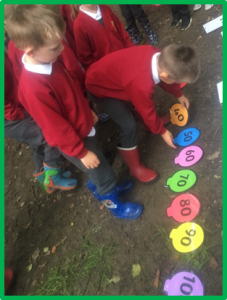
The Subject Leader
I would like to introduce myself as Mr Frost, maths subject leader here at Hillside Primary school. I believe that mathematics is an essential tool for everyday life and at Hillside we are committed to developing a positive attitude, competence and confidence in mathematical knowledge, concepts and skills. The children are expected to be able to solve problems, reason, think logically and work systematically. I strongly advocate that children understand the importance of mathematical competence in the wider world so encourage class teachers to link learning to real life situations and seek opportunities to bring maths into other areas of the curriculum to give children purpose and motivation to achieve.
I believe that children should have some autonomy over their learning. Staff differentiate tasks via bronze, silver, gold and platinum. This approach enables children to choose their starting point; this will be different depending on the concept being taught. As the ‘master in the room’, the teacher over-sees this process to ensure that children are adequately challenging themselves. The breadth challenge across these four levels ensures children have opportunities to consolidate and practise fluency as they require, whereas those children who need it can deepen their learning through using and applying, reasoning and fluency tasks.
Moderation of the standards of children’s work and of the quality of teaching in mathematics is my responsibility alongside other members of the senior leadership team. My work involves supporting colleagues in the teaching of mathematics, being informed about current developments in the subject, and providing a strategic lead and direction for the subject in the school. I meet regularly with my link governor to review progress in mathematics as they have a passion for ensuring the children of Hillside achieve well in this area of the curriculum.
Curriculum Design
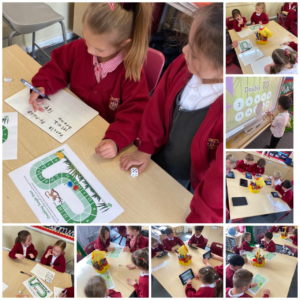 Our mathematics curriculum has been designed with breadth and depth in mind. At Hillside, we do not want to merely cover curriculum content but for our children to have the skills and processes to apply their maths learning to a variety of contexts. Teaching staff designed the curriculum to ensure each National Curriculum objective is broken down with opportunities for fluency, reasoning and problem solving through the ‘Bronze, Silver, Gold and Platinum’ differentiated approach. Where possible, opportunities to provide real-life contexts for mathematical learning are sought both in maths lessons and in foundation subjects: teachers plan to teach essential maths skills that will support learning in science, history, geography and the other subjects. For example, teachers plan to cover data handling objectives in discrete maths lessons and then revisit and repeat the use of these skills during a science lesson where the children have been asked to plot the growth of a plant in different settings. Our priorities to provide children with essential lifelong skills are supported through our mathematics curriculum and we will continue to revisit our curriculum design each year to ensure that we offer our children the very best in an ever-changing world and society.
Our mathematics curriculum has been designed with breadth and depth in mind. At Hillside, we do not want to merely cover curriculum content but for our children to have the skills and processes to apply their maths learning to a variety of contexts. Teaching staff designed the curriculum to ensure each National Curriculum objective is broken down with opportunities for fluency, reasoning and problem solving through the ‘Bronze, Silver, Gold and Platinum’ differentiated approach. Where possible, opportunities to provide real-life contexts for mathematical learning are sought both in maths lessons and in foundation subjects: teachers plan to teach essential maths skills that will support learning in science, history, geography and the other subjects. For example, teachers plan to cover data handling objectives in discrete maths lessons and then revisit and repeat the use of these skills during a science lesson where the children have been asked to plot the growth of a plant in different settings. Our priorities to provide children with essential lifelong skills are supported through our mathematics curriculum and we will continue to revisit our curriculum design each year to ensure that we offer our children the very best in an ever-changing world and society.
Mastering the Curriculum
The concrete, pictorial and abstract (CPA) sequence underpins the approach to teaching that all teachers execute when introducing children to new concepts. This is a non-linear approach in which all children are introduced to a new concept by using real-life objects or concrete manipulatives which represent those objects.
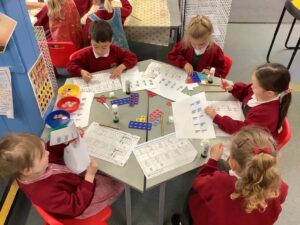 In order to understand what this is and why it is important for us to teach in this way, it is first of all important to understand what ‘mastery’ is in the realm of maths and what it looks like. Mastering maths means pupils acquiring a deep, long-term, secure and adaptable understanding of the subject. The phrase ‘teaching for mastery’ describes the elements of classroom practice that combine to give pupils the best chances of mastering maths. Achieving mastery means acquiring a solid enough understanding of the maths that’s been taught to enable pupils to move on to more advanced material and apply their understanding to real-life or abstract concepts. Attaining mastery means that a pupil can really understand ‘why’ certain mathematical processes happen in the sets of rules we use to solve problems; for example, why we carry a ‘1’ in column addition; why a triangle has half the degrees of a square; why we times by the bottom and multiply by the top when finding a fractional amount of a given value. In order to ensure that this learning is not missed, research suggests that children need to experience maths both visually and kinaesthetically in order for them to completely understand something abstractly (i.e. just with numbers).
In order to understand what this is and why it is important for us to teach in this way, it is first of all important to understand what ‘mastery’ is in the realm of maths and what it looks like. Mastering maths means pupils acquiring a deep, long-term, secure and adaptable understanding of the subject. The phrase ‘teaching for mastery’ describes the elements of classroom practice that combine to give pupils the best chances of mastering maths. Achieving mastery means acquiring a solid enough understanding of the maths that’s been taught to enable pupils to move on to more advanced material and apply their understanding to real-life or abstract concepts. Attaining mastery means that a pupil can really understand ‘why’ certain mathematical processes happen in the sets of rules we use to solve problems; for example, why we carry a ‘1’ in column addition; why a triangle has half the degrees of a square; why we times by the bottom and multiply by the top when finding a fractional amount of a given value. In order to ensure that this learning is not missed, research suggests that children need to experience maths both visually and kinaesthetically in order for them to completely understand something abstractly (i.e. just with numbers).
The CPA approach is a vessel through which children’s understanding of abstract concepts is mastered because they have seen and experienced ‘why’. It begins when children are introduced to a new mathematical concept through the use of concrete resources or manipulatives. These resources could include the real objects mentioned in the problem, such as flowers, sweets or pencils and pens; or it could include other manipulatives designed to represent these objects such as Dienes blocks, place-value counters or Numicon. These manipulatives are used to represent the problem that children are faced with: it allows them to ‘see’ the problem.
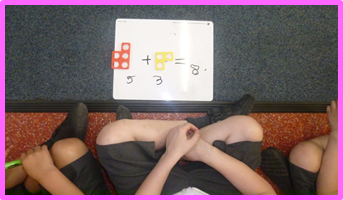 They then move on to pictorially representing the same problem by drawing bars, blocks, lines or circles, for example, to show what is happening with these manipulatives.
They then move on to pictorially representing the same problem by drawing bars, blocks, lines or circles, for example, to show what is happening with these manipulatives.
The abstract stage involves children representing the problem they have been working on with numerals – the abstract stage.
It is important to note that these stages are not linear nor are they prescriptive. As the ‘master’ in the room, the teacher may decide that some pupils are ready to move on to abstract before others and other pupils may need to re-visit the concrete stage after moving to pictorial. These steps across a lesson or over a series of lessons can help children make the link between numbers and the real-world and therefore helps to secure their understanding of the mathematical concept they are learning.
In addition to the CPA approach, research around metacognition underpins our approach to the delivery of maths content. Teachers use precise questioning in class to test conceptual and procedural knowledge and effective modelling of concepts allows our children to view the workings and thinking of ‘the master at work’. Children are given adequate time to practice concepts with scaffolds and supports gradually being withdrawn to ensure the children have opportunity to grapple with new learning in order for it to eventually be committed to the long term memory. Research suggests that in order for children to really grasp a concept, they must be exposed to it numerous times. With this in mind, staff intelligently plan to re-visit mathematical concepts in afternoon lessons such as history, science or geography. Furthermore, ‘warm-ups’ encourage children to revisit previous objectives on a daily basis. 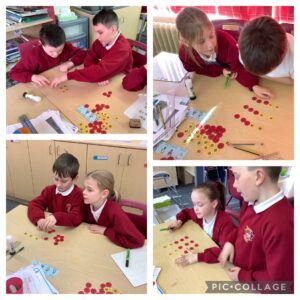
Mastery of maths, builds gradually as a child goes through school, is a tool for life, and immeasurably more valuable than the short term ability to answer questions in tests or exam. We are not in favour of labelling pupils as ‘high ability’ or ‘low ability’ and always put the ownership of learning on the children themselves. This approach is now the basis of each maths lesson and, with some teacher guidance if required, children are given a choice of where they will begin their learning and are encouraged to take charge of the progress they make during the lesson by moving themselves on. Classes from year 1 to year 6 are using a ‘Bronze, Silver, Gold, Platinum’ approach to the activities that are set. This system enables the children to either consolidate their understanding and develop fluency of concepts (usually bronze and silver) or to apply their mathematical skills to reason and problem solve (usually gold and platinum).
When walking into a typical maths lesson it is evident that there is a challenging, engaging ethos that promotes a positive and confident attitude to maths as an exciting, creative and relevant subject. We also want to ensure that all our children realise their potential of becoming confident and enthusiastic mathematicians. Our curriculum is designed to ensure that there is a focus on promoting core maths skills; such as multiplication tables, number bonds and place value; as well as practical maths and 'using and applying' skills which promote independent problem solving skills and mastery.
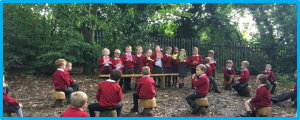
Mathematics across the Curriculum
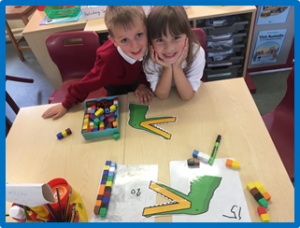
A detailed, structured curriculum is mapped out across all phases, ensuring continuity and supporting transition. Effective mastery curricula in mathematics are designed in relatively small carefully sequenced steps, which must each be mastered before pupils move to the next stage. Fundamental skills and knowledge are secured first. This often entails focusing on curriculum content in considerable depth at early stages.
Mathematics within the EYFS is developed through purposeful, play based experiences and will be represented throughout the indoor and outdoor provision. The learning will be based on pupils’ interests and schemas or current themes and will focus on the expectations from the Early Years Outcomes. As the pupils progress through, more focus is placed on representing their mathematical knowledge through more formal experiences. Pupils will be encouraged to record their mathematical thinking when ready and this will increase throughout the year. It is important that children are encouraged to master number and lessons which focus on this happen daily. Assessment in the Foundation Stage is carried out through teacher-led activities and termly formal assessments.
As a school, we are passionate about children acquiring the basic skills of mathematics that will be valuable to them as they move on to further education and beyond.
We hold the following skills in high regard and children are encouraged to:
- have a well-developed sense of the size of a number and where it fits into the number system (place value)
- know by heart number facts such as number bonds, multiplication tables, doubles and halves
- use what they know by heart to figure out numbers mentally
- calculate accurately and efficiently, both mentally and in writing and paper
- draw on a range of calculation strategies
- make sense of number problems, including non-routine/’real’ problems and identify the operations needed to solve them
- explain their methods and reasoning, using correct mathematical terms
- judge whether their answers are reasonable and have strategies for checking them where necessary
- suggest suitable units for measuring and make sensible estimates of measurements
- explain and make predictions from the numbers in graphs, diagrams, charts and tables
- develop spatial awareness and an understanding of the properties of 2D and 3D shapes
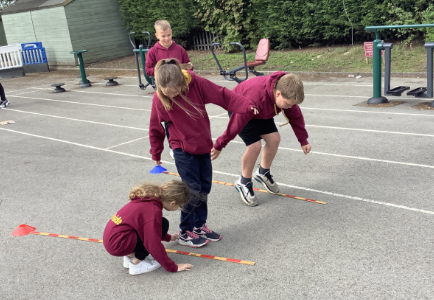 To provide adequate time for developing mathematics, maths is taught daily and discretely. However, application of skills are linked across the curriculum where appropriate; staff are keen to capitalize on opportunities in subjects such as science and geography where learning becomes purposeful and encourages application.
To provide adequate time for developing mathematics, maths is taught daily and discretely. However, application of skills are linked across the curriculum where appropriate; staff are keen to capitalize on opportunities in subjects such as science and geography where learning becomes purposeful and encourages application.
Attached below are the various aspects of the maths curriculum that are covered by each year group in line with the National Curriculum expectations. These help teachers to ensure that all areas of the maths curriculum are covered for the relevant year group.
These plans are used as a guide for teachers to use in their maths planning. However, teachers are expected to use assessments and ongoing daily marking to inform their planning and make changes to the length of time spent on units during the spring and summer term. Teachers track the objectives taught and use this to inform their planning.
Please find attached the calculation policy for addition, subtraction, multiplication and division also.
Times Tables
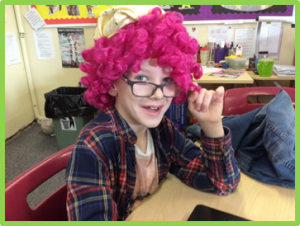
Times tables are taught throughout the school in a consistent manner which focuses on recall, fluency and eventually speed. An online programme is used to enable children to practise their times tables online, at home and at school. The children record and monitor their own progress and have a full awareness of the times tables they need to secure. Each child from Year 2 upwards has their own Times Tables record sheet, in their maths book, which shows their progress when learning times tables. Children are tested on a regular basis to ensure that they know all of their times tables by the expected stages in their education. Children are rewarded with stickers to mark their achievements. It is expected that children will know all of their times tables to 12 x 12 by the end of Year 4. Children beyond Year 4 focus on learning multiples of larger numbers, square numbers and cube numbers and they continue to consolidate their knowledge of division and multiplication facts up to 12 x 12.
At Hillside we use an exciting, interactive maths programme to teach the children the essential skill of recalling their multiplication and division facts. The national expectation is that every child will be able to answer any times table question or division fact mentally within a five second period. Times Tables Rock Stars is an online programme which also requires the children to answer multiplication and division questions on paper at least three times per week, whist listening to rock music to motivate and engage them.
The online programme contains a competitive element where the children collect coins for every answer they input correctly. The more coins they earn, the more accessories they can buy for their avatar and the higher up the school leader board they will go. This resource is accessible and is a fun and engaging way to learn a vital mathematical skill.
Maths Assessment
This section details the various assessment methods and practices used in Hillside through which we ensure that children are making appropriate progress and that the activities they take part in are suitably matched to their attainment and development level.
Formative Assessment (AfL) - (monitoring children’s learning)
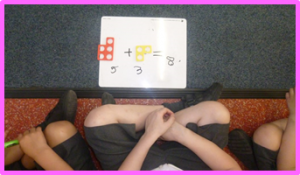 Assessment is an integral and continuous part of the teaching and learning process at Hillside and much of it is done informally as part of each teacher’s day-to-day work. Teachers integrate the use of formative assessment strategies such as: effective questioning, clear learning objectives, effective feedback and response in their teaching and marking and observing children participating in activities. Children are encouraged to self-assess, with some leaving comments for their class teachers to communicate with them how well they understood the lesson and what their next steps are. Findings from these types of assessment are used to inform future planning.
Assessment is an integral and continuous part of the teaching and learning process at Hillside and much of it is done informally as part of each teacher’s day-to-day work. Teachers integrate the use of formative assessment strategies such as: effective questioning, clear learning objectives, effective feedback and response in their teaching and marking and observing children participating in activities. Children are encouraged to self-assess, with some leaving comments for their class teachers to communicate with them how well they understood the lesson and what their next steps are. Findings from these types of assessment are used to inform future planning.
Summative Assessment – (evaluating children’s learning)
More formal methods are used to determine the levels of achievement of children at various times during the school year: during assessment week, half- termly assessments are used as a way of recording children’s progress in objectives covered across that specific term. This information is then updated on the online tracking tool available to teachers. Furthermore, teachers conduct a question-level analysis (QLA) of the half-termly assessments so that they can see clearly strengths and areas for development. This informs their planning of subsequent units.
Statutory End of Key Stage Assessment
The National Curriculum requires that each child is assessed at the end of KS1 and KS2. Statutory tests determine whether the children are working below, at or above the expected standard. In KS1, the assessments coupled with teacher assessment form the overall standard the children reach. In KS2, teachers submit a separate teacher assessment judgement based on the interim frameworks. To show that pupils have met the standard, teachers provide evidence that a pupil demonstrates consistent attainment of all the statements within the standard.
Assessment for Learning – Self and peer assessment
All children from Nursery to Year 6 are asked to make judgements about how they can improve their own work, through a range of self-assessment techniques (e.g. marking codes, thumbs up – thumbs down etc). Children are also given the opportunity to take part in peer-to-peer assessment where they support their peers in looking at how to improve their work. At the end of every lesson, each child uses the code A, B or C to demonstrate the effort they have shown within the lesson and 1, 2 or 3 to demonstrate their understanding of the learning objective. In response to this, after the teacher has marked the child’s work, they also use this marking code to show how much the child has understood.
Maths and Spiritual, Moral, Social and Cultural Development
Spiritual
At Hillside, we use maths to support our children’s spiritual development by helping them to develop deep thinking and question the way in which the world works. We want them to feel delight when they have shown resilience and are able to solve questions they once found difficult to solve. Our children are inspired by our topic based curriculum and the links that maths have with other subjects (art, science, design and technology and computing to name a few). We strive to create opportunities that allow the children to use mathematical tools in all areas of learning. Mathematics helps children to make informed decisions in life, based on the skills and confidence gained from choosing the most appropriate method in solving problems. These skills are transferable to real-life situations and therefore help the children become more reflective, responsible and insightful individuals.
Moral
Moral development is supported through discussion about their mathematical understanding, challenging assumptions and supporting children to question information and data that they are presented with. We provide reasoning opportunities where the children are encouraged to prove their answer and give reasons for their thoughts. This allows them to evidence their views not just in maths but in the wider world. As a result, we support our children to understand how logical reasoning can be used to consider the consequences of particular decisions and choices and help them learn the value of mathematical truth.
Social
At Hillside, self-esteem and building self-confidence is integral to social development and we use growth mind-set, metacognition and our differentiation model to support this. Collaborative learning is encouraged at Hillside in the form of listening and learning from each other and paired discussion and working with partners. Our learning structures in school are based on the active engagement and cooperation work by Dr Spencer Kagan. Working cooperatively enables the children to think for themselves and promotes the retention of new learning. The use of ‘Maths Ambassadors’ provides opportunities for children to socialise with each other across the school. The children are able to see the benefits of working together as a team and they understand that collaboration is the key to their success.
Cultural
Maths supports pupil’s cultural development by developing an appreciation with the pupils that mathematics, its language and symbols have developed from many different cultures around the world. This is often learnt through the teaching of historical periods such as the Romans, the Greeks, the Mayans and many other cross-curricular topics. Our children are encouraged to appreciate the range of different cultures in school and further afield as an essential element of their preparation for life in modern Britain.
Cross Curricular Mathematics
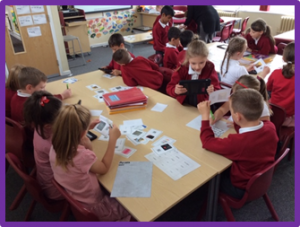 The National Curriculum statement for mathematics (DFE) refers to mathematical skills that ‘support learning across the curriculum’. At Hillside, we take advantage of opportunities that arise to link mathematical knowledge and skills across the curriculum. For example, in year 6 children use censuses to gather information about people from the past and answer maths questions about the people lived in a street in Hanley during the Victorian era; children measure the distances of their long-jumps and find their mean (average) in P.E in year 5; in year 4 children use bar charts to present data about the residential and commercial land-use in Manhattan; and in year 1 children head to the local village to record in tele-charts the types of transport that pass them. Other cross-curricular learning includes children in year 4 ordering historical events on timelines; and year 2 use positional language to describe the direction of Columbus’ journey to the Americas. We recognise the importance of cross curricula learning and how mathematics can be brought to life when it is linked to practical, real life examples.
The National Curriculum statement for mathematics (DFE) refers to mathematical skills that ‘support learning across the curriculum’. At Hillside, we take advantage of opportunities that arise to link mathematical knowledge and skills across the curriculum. For example, in year 6 children use censuses to gather information about people from the past and answer maths questions about the people lived in a street in Hanley during the Victorian era; children measure the distances of their long-jumps and find their mean (average) in P.E in year 5; in year 4 children use bar charts to present data about the residential and commercial land-use in Manhattan; and in year 1 children head to the local village to record in tele-charts the types of transport that pass them. Other cross-curricular learning includes children in year 4 ordering historical events on timelines; and year 2 use positional language to describe the direction of Columbus’ journey to the Americas. We recognise the importance of cross curricula learning and how mathematics can be brought to life when it is linked to practical, real life examples.
Growth Mindset
Though the phrase ‘I’m no good at maths’ or ‘I can’t do maths!” is common amongst some children, at Hillside we aim to foster a ‘can do’ attitude, which encourage children to make mistakes, challenge themselves, put in effort and use independent strategies. We encourage the children to change their mindset and think positively about their learning. The children have been taught to believe that they can ‘do maths.’ So instead of saying ‘I can’t do it!’ they children follow the sentence with ‘yet!’ The children know that once they have learnt all the skills that they will eventually solve the problem. This growth mindset approach towards maths helps us all to achieve more than we believe we can.
Enrichment

Children exercise positive attitudes towards mathematics due to the wealth of enrichment opportunities they are provided. We try to involve children in the decisions that are made about mathematics as much as possible; therefore, we have a team of maths ambassadors as seen in the picture. Our maths ambassadors’ main priority is to promote positive attitudes towards mathematics and they do this by running regular assemblies, challenging negative responses towards maths and organising and running exciting events in school such Times Table Rock Stars battles, number days and year group challenges. In addition, this enthusiastic group of individuals run a dedicated times tables club to support Year 4 children to learn all the multiplication and division facts up to 12 x 12. The children use online resources, games and engaging activities to motivate the children and ensure they are secure with this basic skill. The maths ambassadors support the staff in making the teaching of maths the best it can be and are the voice of the pupils. Regular meetings are held fortnightly and play an integral part in the decisions that we make as a school around mathematics. We are so proud to have such enthusiastic and dedicated children to promote numeracy for life at Hillside. 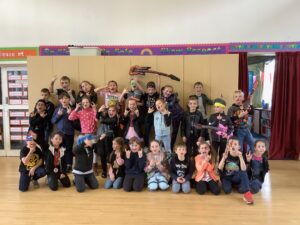
Each year, we take part in ‘Number Day’. For this event, children come dressed in an outfit which has a number on it. The aim is to develop positive, can-do attitudes towards maths. Learning consists of number hunts (using the numbers they have worn), practise of basic maths skills using our amazing online programmes (TT Rock Stars and Numbots), escape rooms and careers-based learning. It is always wonderful to see the children dressed in their digits.
Rockstars day is always a success and develops an enthusiasm for times tables which can be felt throughout the school. On this day, children come dressed as a rockstar and take part in a city-wide and in-school times tables competition.
Pupil Voice
Our children have a love and enthusiasm for maths at Hillside and this demonstrated in their values and attitudes. The following quotes demonstrate some of the comments made when our children were asked about maths at Hillside:
‘I really challenged myself today in maths. I did gold and then platinum.’ Year 2 Pupil
‘We are more positive towards maths because of Mr Frost’s growth mind set assemblies. We know that if the work is hard we will eventually get there with the help of our teachers.’ Year 5 Pupil
‘I like looking for numbers in the woods.’ Reception Pupil
‘I like writing notes to my teacher after I have finished my work. She always writes back to me.’ Year 6 Pupil
‘I love looking in my book and seeing a fix it challenge. Even if I struggle to answer it I know that it is a good thing to be challenged.’ Year 4 Pupil
Careers
